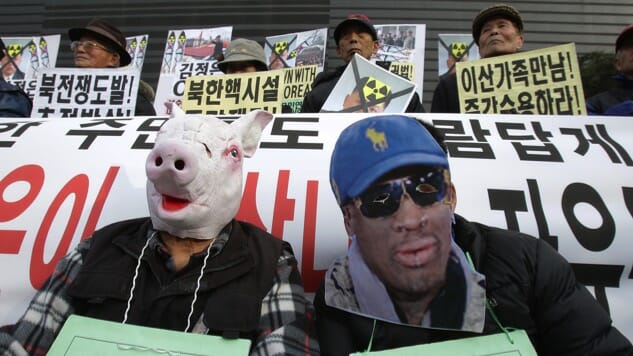K-Pop and Kidnappings: The Incredibly Weird Story of Pop Culture on the Korean Peninsula
Photo by Chung-Sung Jun
Before Korea was divided into two separate autonomous states, it was dominated by colonialism that led to the percolation of cultural influences from imperialists like Japan and China. Since the end of both WWII and Japanese imperialism, the split of Korea has resulted in a juxtaposition between the North—which continues to be very opposed to outside cultural influences by enforcing isolationism upon its people—and the South which has embraced cultural influences from around the world while translating them into trend-setting media. Through exporting intangible pop culture including their famed incarnation of pop music (KPOP), the idea of professional video gaming, a deluge of internet phenomena, and the awesomely violent Korean film industry, South Korea has become the largest exporter of pop culture in the world.
South Korea consumes and produces a copious amount of pop culture, their government actively strives to disseminate Korean media as a soft power play to carve out their place on the world stage and forge the flow of money through the capitalist country. And it has worked. When the Korean peninsula fractured after years of cultural suppression and censorship, the South swiftly became a pop culture juggernaut.
Among the most popular cultural exports, South Korea adopted the American model of pop music and refined it into a wildly popular style known worldwide as KPOP, which radiates with the bubblegum eccentricity of artists such as f(x). In addition, the concept of han—or deep seated feelings of injustice, oppression, and the desire for revenge said to be inherent to all Koreans—has informed South Korean films like OldBoy. Other emotions have been explored in TV dramas, which are extremely popular in the South of the peninsula and abroad. The country has also popularized online activities such as broadcast eating, and video gaming has become a reputable and lucrative profession in the highly capitalist consumer culture, worthy of sponsorship and fame. Finally, South Korea is home to Samsung, one of the top technology companies bringing all this media to you on your smart phones and TVs.
-

-

-

-

-

-

-

-

-

-

-

-

-

-

-

-

-

-

-

-

-

-

-

-

-

-

-

-

-

-

-

-

-

-

-

-

-

-

-

-








































